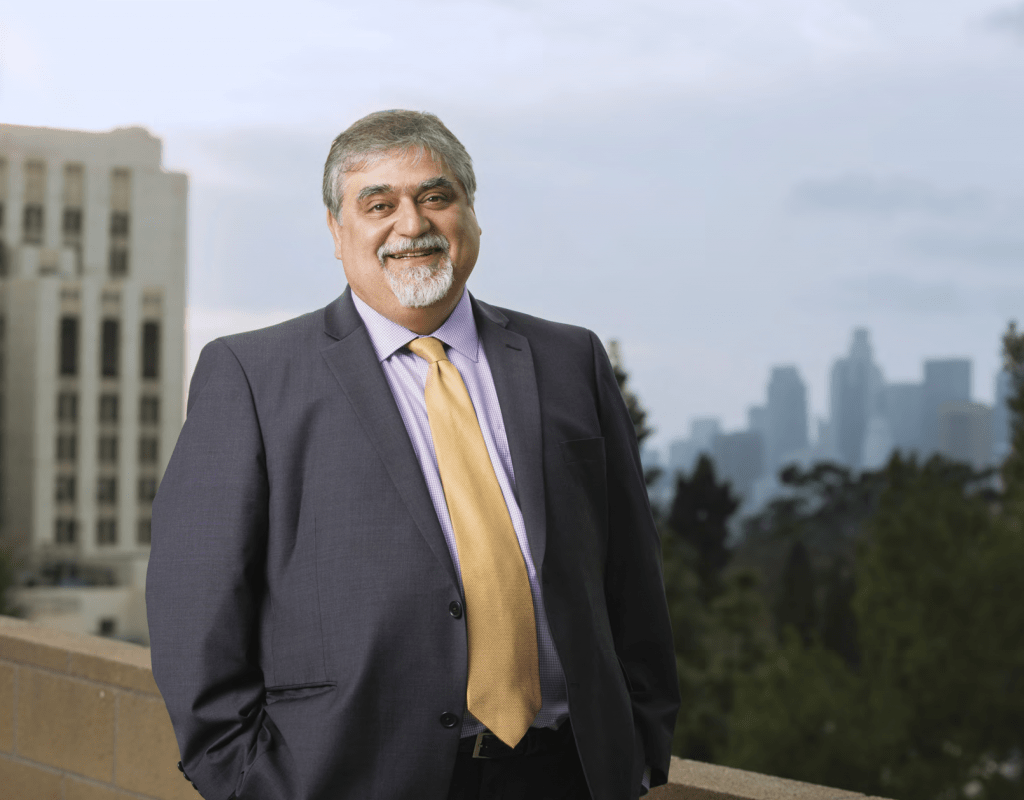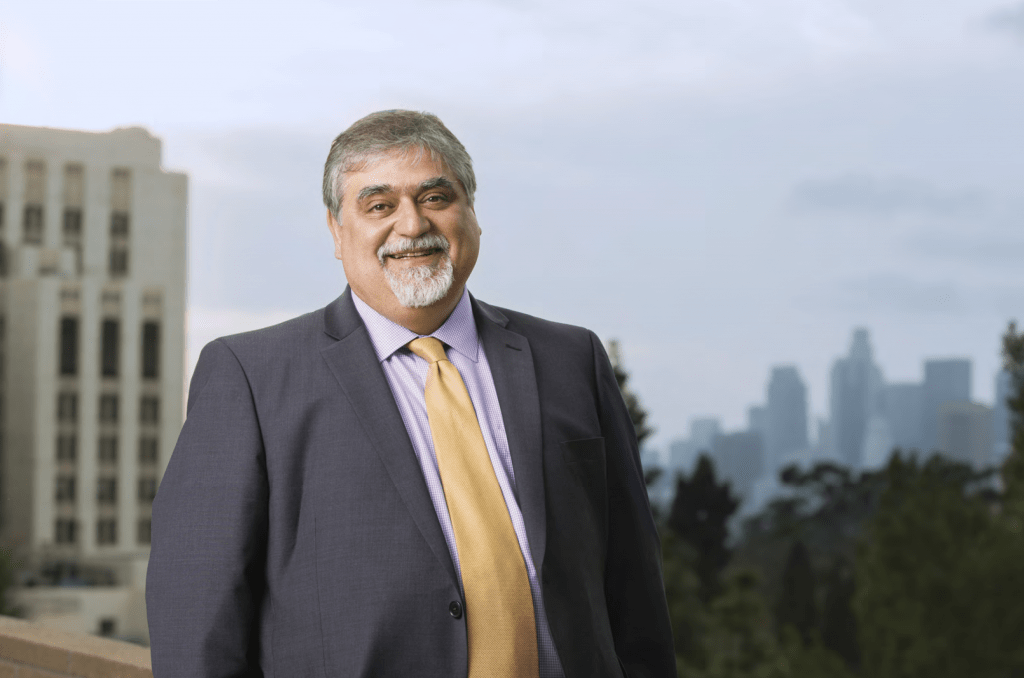Graduating from high school at age 17, finishing pharmacy school at 21, publishing his first research paper at 22, completing his PhD and postdoc by 28, and earning full tenure at 32, Vassilios Papadopoulos has “always liked being fast.” He’s also lived all over the world, from his native Greece to his early career in France and Australia, followed by moves to Washington, D.C., and Montreal, where he led more than 500 researchers and 1,200 students at the Research Institute at McGill University Health Centre. While at McGill, he netted the largest government grant in Canadian history.
On October 1, Papadopoulos joined USC as the new dean of the school, where he will continue his steroid hormone research, which has major applications in aging, cancer, reproductive disorders and neurodegenerative diseases.
Here he shares his career journey, his leadership philosophy and his vision for the school’s future.
What attracted you to the field of pharmacy?
VP: I liked the diversity. At the time, in the University of Athens pharmacy program, it was a mixture of chemistry, medicine and other fields. Pharmacy encompasses such a vast range of possibilities.
Tell us about your research.
VP: My lab focuses on steroid hormones. They are widely used — if you take estrogen, the pill, testosterone or cortisone, you’re taking a steroid. We’re conducting long-term studies to find alternatives to hormone replacement therapy, which can be dangerous. My lab has been working on mechanisms to induce steroid production in the testes and brain so the body can restore its ability to produce its own hormones. And we are working on a new blood test based on the alteration of steroid levels in the brain to diagnose Alzheimer’s disease and neurodegeneration. We are now in a study of 500 patients.
Did you practice pharmacy as well?
VP: In preparation for my pharmacy license, I practiced under the guidance of a senior pharmacist in the south of Greece, in our family village of Filiatra in the Kalamata region of Peloponneus. It’s an agricultural area five minutes from the sea, growing tomatoes, cucumbers, olive trees — and, at that time, it had only one pharmacy. The pharmacist there also served as the physician, vet and confidante. I learned a lot.
How did you end up in Australia?
VP: Many of the people I worked with in Greece and France were trained at the Worcester Foundation for Biomedical Research, near Boston, where the contraceptive pill was developed. Worcester was considered the mecca of steroid research, so of course I wanted to work there, too. I was accepted as a postdoc to work with the director, Peter Hall, but then, a month before I was supposed to leave for Boston, I received a phone call from Hall, who was Australian. He was moving to the University of New South Wales in Sydney. So I changed my tickets, and I landed in Sydney on January 1 with cold-weather clothes. It was 100 degrees outside.
You would later chair Georgetown’s Department of Biochemistry and Molecular Biology and become the university’s associate vice president for research. What were your benchmarks of success?
VP: You have to identify sources of funding so the good things that are happening can be grown without stopping for lack of funding. For example, we developed and expanded the master’s programs in biotechnology and other areas. You also have to support students and make them feel part of the family. And of course you have to build consensus among faculty.
After Georgetown, you moved to McGill. What were your biggest challenges there?
VP: I led a number of initiatives to expand our work at the Research Institute at McGill University Health Centre, including what turned out to be the biggest grant in the history of Canada. We had to travel all over the world to work with companies to develop equipment for us that did not yet exist. We constructed a $1.5 billion hospital within the larger medical center. It opened in 2015. It’s a huge operation. I’m grateful for the support I received from the provincial and federal government, foundations, donors, faculty, staff and students.
What attracted you to USC?
VP: The university is on an undeniable upward trajectory. It’s a bold and exciting place, accomplishing major advances at an impressive speed. USC clearly values innovation and interdisciplinary collaboration. The university is investing in its health sciences enterprise, breaking new ground and forging a distinctive path. And this is a private university, with the flexibility to be nimble and entrepreneurial. That really appealed to me. I also was looking for something different, where I could have a more immediate impact on people’s lives. The school offered a unique opportunity.
How will you apply your philosophy of leadership to USC Mann?
VP: Even though moving fast is important to me, and science and technology are moving at an extraordinary pace, I am taking time to meet with everybody — including all staff and faculty — to fully understand the environment and the culture. Things that worked in Washington and Montreal might not work in L.A. There is no defined recipe.
What are some of your goals for the school’s future?
VP: The school has a global footprint with research and educational collaborations around the world. I want to see us build upon this foundation to become a leading international school. The time is also ripe to expand job placement opportunities for our graduates by enhancing the school’s integration with the biotechnology and pharmaceutical industries and by promoting a wider range of options in such areas as government and regulatory affairs, environmental organizations, and beyond. Overall, I want to see how we can place the school on a trajectory that will be moving up at every level. So much has already been accomplished, and the ingredients are all in place. Now we must put them all together to make the soup — perhaps a nice bisque.
Speaking of food, tell us about your three sons — one of whom is a chef.
VP: One has just become a lawyer, another is doing a master’s in computer science programming and our youngest is studying at the Culinary Institute of America — he’s the chef of the family.
Do you and your wife, Dr. Martine Culty, still have family in Europe?
VP: My wife has. I just have a sister. She’s an ambassador of Greece, so she moves around a lot, like I have. She was at the consulate in New Orleans, then in Toronto, and then she represented Greece in the United Nations for years. She also has worked in Jordan and in Brussels, where she represented Greece in the European Union. She now heads the European mission in Kosovo. We are both citizens of the world.
At Georgetown, McGill and now at USC, your administrative duties have always been extensive. How do you find time to conduct research?
VP: I call it my night shift. I focus on my research after 11 p.m. On Sundays, I may work the whole day. Here at USC, my lab is on the same floor as the dean’s office, so that will be great.
What do you see as USC Mann’s strengths?
VP: Certainly its history — not many schools have existed for 100 years. The school has pioneered so many educational initiatives — from the doctor of pharmacy degree to the regulatory science program. Our graduates leave USC prepared to play leadership roles in the profession. This is a real distinction from newer schools. Our location in Los Angeles is another enormous advantage, and one we should leverage more fully. Our faculty conduct cutting-edge research not only in basic science but also in clinical care and health economics and policy. The sky is truly the limit when it comes to the impact this school can have.


